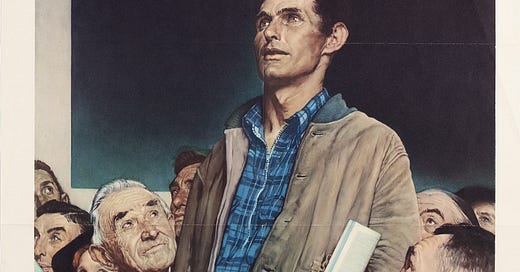The man is standing. That’s the whole story, at first.
He’s wearing a work jacket that looks like it’s done its time in a machine shop or maybe a garage. The collar’s turned up like he just came in from the cold, and his shirt’s the kind of blue flannel that smells like sawdust and engine oil when it’s wet. His hands are clean but rough. The kind of rough that doesn’t go away with soap. Callouses, permanent like the grain in old wood.
Everyone else is sitting. Suits and ties, white collars, eyeglasses. Men with paper programs folded in their laps. The kind you get at town meetings or school board hearings. One of them is turned in his seat, looking up at the standing man with a mix of curiosity and something like admiration. Or maybe confusion. Because the man standing doesn’t quite belong here… not by dress, not by education, probably not by invitation.
But here he is, upright and speaking. Or about to speak. We don’t know what he’s saying, and maybe that’s the point. We’re left in the moment right before the words come. Mouth slightly open, eyes steady, looking somewhere just past the room. He could be asking a question. He could be challenging something. He could just be telling a story. But everyone’s listening. That’s clear.
The painting is titled Freedom of Speech. Norman Rockwell made it in 1943, part of a series inspired by Roosevelt’s “Four Freedoms” speech. It's propaganda, sure. But it’s quiet propaganda. It doesn’t shout. It just shows you something so ordinary it ends up feeling sacred.
This isn’t a courtroom or a capital. It’s a gymnasium or a church basement somewhere in a small-town, where coffee comes in styrofoam cups and the floor still smells faintly of mop water. There’s no podium. No microphone. Just a man who decided it was his turn.
What makes it powerful is what it doesn’t do. It doesn’t idealize. This isn’t the marble-sculpted version of democracy. It’s the flannel version. The scuffed floor and folding-chair version. The version where speaking up means standing up, even when you’re out of place. Especially then.
There’s a bravery in that. Not loud, heroic bravery. Just the kind where a guy with dirt under his fingernails raises his voice in a room full of people who might know more words than he does. The kind of bravery that keeps communities honest. Because someone always has to be the first one to speak. Someone always has to break the hush.
You can almost hear the silence around him. That thick, awkward quiet that settles over a crowd when someone unexpected takes the floor. It’s not hostile. Just uncertain. Like the room’s waiting to decide whether this man’s words matter.
But the faces watching him—they aren’t mocking. They’re listening. They’re watching like they might actually change their minds, depending on what he says next. And that, too, is a kind of courage. Not just speaking but being willing to hear.
The poster, of course, ends with a command: BUY WAR BONDS. The message is clear. If this man can stand up and speak, if this everyday citizen has something worth saying, then the rest of us can dig into our wallets. The freedom he’s using is the one the bonds are meant to defend.
But the propaganda fades, eventually. What lingers is the posture of the man. Straight-backed. Open-faced. Alone, but not lonely. Not defiant, exactly. Just unafraid to be heard.
That’s not something you can manufacture with slogans.
It makes you think about the rooms we sit in now. How often we speak up. How often we stay seated. How often we pretend silence is comfort. Or agreement. Or safety.
The man in the painting reminds you: freedom isn’t the right to shout. It’s the right to be heard. And that right only works if we grant it to people we don’t expect to hear from. People in dusty coats with cracked hands. People who look out of place in boardrooms and banquet halls.
You don’t have to agree with him. But you do have to let him speak.
So the next time you’re in a room like that… fluorescent lighting, lukewarm coffee, a folded agenda in your lap… watch for the person who stands up when they weren’t expected to. The one who isn’t polished or prepared. The one whose voice might shake at the start.
That’s the person you should be listening to.
Because freedom of speech isn’t just about what’s said. It’s about who gets to say it.





Love this.
“Not loud, heroic bravery. Just the kind where a guy with dirt under his fingernails raises his voice in a room full of people who might know more words than he does.” This is the bravery we’ll keep seeing in the days ahead. Love it.